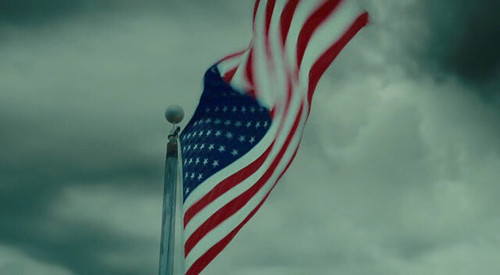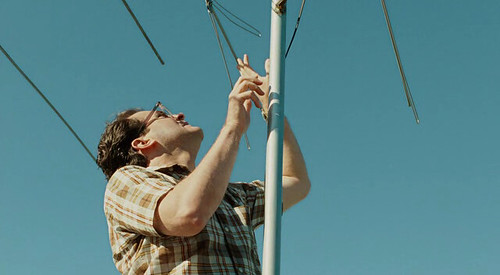Viewing Log #35: Baby birch bleat bang [2/22/10 - 2/28/10]
by Ryland Walker Knight


—Culture clash
- The Holy Girl [Lucrecia Martel, 2004] Just as soon as I wrap up another Word Doc, I'm gonna give this a go, finally, for words to be read elsewhere and later. A real "thinker," as they say.
- Shutter Island [Martin Scorsese, 2010] # Yeah, I went again. More shortly. But, quickly, I'll say that the music is the best part and that I was surprised at, again, how everything feels.
- Landscape Suicide [James Benning, 1986] Okay, I get it now, Matt. Great, just great. Was more partial to the first part set in Orinda, but not only because I used to live there and manage that movie theatre; also because her interview, with all its stammering and indecision, not to mention her note of confession and all its pain, made sense and made her isolation in herself feel real. Put otherwise, it turns the formal into a pathetic appeal. Gein, on the other hand, became more othered, less human. I'd love to see it again, or read a smart text about it, to address my curiosity with its gender divide. At first blush, my neophyte eyes say it's maybe the film of the 1980s. Maybe not my favorite, but easily one of The Great Things.
- American Dreams [James Benning, 1984] Kinda like a great video podcast (only so emulsified that's a silly comparison) with three different threads twined and abutting/overlapping. I spent most of my time reading the Bremer letters and listening to "the radio" while largely ignoring the particulars of the Hank Aaron cards and jigsaws. For that reason, it took me a while to realize that the numbers that kept fading up and down were his home run totals tallying up. Overall a pretty damned tight picture, one worth a look at least twice. And there is a curio corkscrewed into it: Benning himself. From Milwaukee, he must have been a fan of Aaron, and may have collected more than a few of those cards, if not all of them. And what does his inclusion in these dreams mean? I'm not one for investigating behind the screen all that much, but it seems impossible not to here, despite the abundance of material culled from general Americana. Because, if Benning's singing this song (these songs), what's his dream? Only to critique? Or just to witness? How's it not his diary, too?
- Shutter Island [Martin Scorsese, 2010] Plenty surprised by this one, but not by the so-called twist, and not because I "saw it coming" or whatever but because everything fits from the get-go. Plenty more to say, even after all the internet mess. Will try my hand at it for another outlet shortly. Mostly I dig stories about storytelling, and architecture, so this was a treat on that level. And it kicked me in some sore spots in unexpected ways.
- The Wire: "The Target" [S1E1, Clark Johnson, 2002] Somehow forgot all about this episode. Not a single scene seemed familiar. The pacing's all wonky, nobody's in a rhythm and it's only the dialog that's interesting. Or so it appeared to me. I was tired and full of risotto. Still, there are some good things, of course, and some jokes, but it's so damned self-serious it's kind of obnoxious. Maybe I'll go through Season One again while it's on demand. I do want to see the "Fuck" scene again in the context of its episode.
- Lost: "Lighthouse" [S6E5, Jack Bender, 2010] Kind of like a big 45 minutes of "duh" (but what do I know?).
- Winter [Nathaniel Dorsky, 2008] tweet: all in the rain beads on that hood / truly SF / floating quince blossoms in plastic, & so many circles / the wettest, most palpable
- Aubade [Nathaniel Dorsky, 2010] tweet: bright, static / color lines dont twirl / purple rises, stands, almost billows, sways / closes with a door closing
- Compline [Nathaniel Dorsky, 2009] tweet: aerial, more angular / more pools of light round clouds / a ribbon of blue carousels across a diagonal near forever / lift off
- Sarabande [Nathaniel Dorsky, 2008] tweet: a nest, thatched thick / to reorient gravities / to look *through* things at the world.
- The Same River Twice [Rob Moss, 2003] # The first half hour or so, for a little ditty I'll link to soon. For now: Karen Schmeer, you knew how to weave things. Now this film takes on even more sentimental value—and I never got to meet you! Also worth noting: can't wait to go rafting this summer.
- A Serious Man [Coens, 2009] # Yikes! More here, in simple and (I guess) serious terms. The revisit made me think of sound a lot, and tuning, but that didn't make it into the finalized edit. In fact, I think a lot more things. I could probably write two thousand words, not just six hundred, on this movie.





I just thought it had a cool title.
ReplyDeleteGonna call my next blog American Dreams.
The first few episodes of WIRE S1 seemed problematic to me, so it was almost a year before I started watching it in earnest. Unlike everyone I've talked to, I found the "fuck" scene annoying and mannered - in fact, it was the point where I decided to quit.
ReplyDeleteMatt, you should really call it "Casting a glance."
ReplyDeleteJaime, I can see that, but in a show all about language, and the word, it jumped out as just that: a tiny encapsulation of how one word can, with the right emphasis, mean a whole bunch of things. It's simple, and maybe, oddly, overdetermined, but the two actors sold it for me the first time I saw it. (Still haven't gone back to the show, clearly.)
And, for the VINYL record, I just left the longest comment I've ever written on my facebook page in response to some dudes calling A SERIOUS MAN the opposite of nihilist. It goes like this:
ReplyDeleteNo, no, no! This is the furthest thing from humanism. And nihilism, again, isn't just a synonym for dread. Nihilism is a tricky word to use, I guess, with all its popular misuse/reduction.
Nihilism, as I understand it, and as got lost somewhere in the piece's formation, is a process (I'm thinking Kierkegaard just as much as Nietzsche) of dissolution; you reach a distrust of all meaning; it's not an end in and of itself; it doesn't start from a lack of meaning. Nihilism is about a crisis, and reaching that crisis, and what we might do to live past such a crisis. And faith, as it happens, can't protect you from that.
I'd say the dybbuk story does illustrate some kind of test, but it doesn't aim to answer anything, or really illustrate anything, other than that baseline absurdity. In a lot of ways, the movie's a big throwing up of the hands.
The central metaphor I used in the first version of this now-"streamlined" (for accessibility?) essay was listening. Ears abound! Everybody's listening to something besides themselves. And Larry's forever asking about Hashem, the word, as something to hear (that he doesn't hear). But if we believe the Rabbi Nachtner, who offers the most convincing illustration/encapsulation of the film, it's up to you to hear yourself. This puts the onus on the human, sure, but this isn't humanism. It's a lot closer to pragmatism--as a reaction to nihilism's approach and eventual onset.
At bottom, it comes down to the song. All that Larry sees as truth has turned to lies, and he's lost with nobody to love. The film doesn't offer that.
All that said, I'm glad you guys found stuff to really feel in the picture. It just scared the bejesus out of me. And I know that this says as much about me as your reactions say something about what you brought to this conversation of faith that the film precipitates.
'you should really call it "Casting a glance."'
ReplyDeleteYeah, I like that. More. But too late!
Also like the way you describe the start of The Wire - it took me quite a while to get into it (towards the end of s1), and I still fear that it's sorely overrated. No doubt a pretty hackneyed call to make now, but I don't believe that everybody who's been going nuts over it has been exposed to 60 hours of Wiseman (me included), or read 60 hours worth of Dickens (kinda loath that comparison). If we all had, it sure would feel far more minor than it does.
I've been on the "it's not great" forefront for some time. In fact, since I watched it the first time, which was in preparation for Season Five. No doubt it's "important" but good grief it's ballooned into an overblown pat on the back by a lot of white people. That said, there are a lot of things I dig: all the black actors, a lot of the dialogue, and seasons 3 and 4 especially. Finally, yes, I agree: people need to quit it with the Dickens analogies.
ReplyDelete